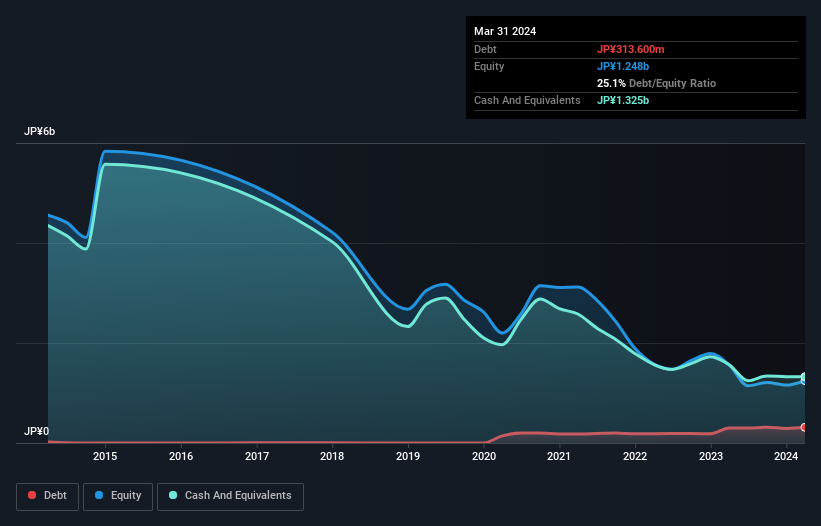
Warren Buffett famously said, 'Volatility is far from synonymous with risk.' It's only natural to consider a company's balance sheet when you examine how risky it is, since debt is often involved when a business collapses. Importantly, Chiome Bioscience Inc. (TSE:4583) does carry debt. But should shareholders be worried about its use of debt?
When Is Debt A Problem?
Debt and other liabilities become risky for a business when it cannot easily fulfill those obligations, either with free cash flow or by raising capital at an attractive price. Ultimately, if the company can't fulfill its legal obligations to repay debt, shareholders could walk away with nothing. However, a more frequent (but still costly) occurrence is where a company must issue shares at bargain-basement prices, permanently diluting shareholders, just to shore up its balance sheet. Having said that, the most common situation is where a company manages its debt reasonably well - and to its own advantage. When we think about a company's use of debt, we first look at cash and debt together.
Check out our latest analysis for Chiome Bioscience
What Is Chiome Bioscience's Debt?
As you can see below, at the end of March 2024, Chiome Bioscience had JP¥313.6m of debt, up from JP¥301.0m a year ago. Click the image for more detail. However, it does have JP¥1.33b in cash offsetting this, leading to net cash of JP¥1.01b.

How Healthy Is Chiome Bioscience's Balance Sheet?
The latest balance sheet data shows that Chiome Bioscience had liabilities of JP¥451.6m due within a year, and liabilities of JP¥54.8m falling due after that. Offsetting this, it had JP¥1.33b in cash and JP¥83.7m in receivables that were due within 12 months. So it actually has JP¥902.6m more liquid assets than total liabilities.
This short term liquidity is a sign that Chiome Bioscience could probably pay off its debt with ease, as its balance sheet is far from stretched. Succinctly put, Chiome Bioscience boasts net cash, so it's fair to say it does not have a heavy debt load! There's no doubt that we learn most about debt from the balance sheet. But it is Chiome Bioscience's earnings that will influence how the balance sheet holds up in the future. So if you're keen to discover more about its earnings, it might be worth checking out this graph of its long term earnings trend.
Over 12 months, Chiome Bioscience made a loss at the EBIT level, and saw its revenue drop to JP¥643m, which is a fall of 4.3%. We would much prefer see growth.
So How Risky Is Chiome Bioscience?
We have no doubt that loss making companies are, in general, riskier than profitable ones. And the fact is that over the last twelve months Chiome Bioscience lost money at the earnings before interest and tax (EBIT) line. And over the same period it saw negative free cash outflow of JP¥1.1b and booked a JP¥1.3b accounting loss. However, it has net cash of JP¥1.01b, so it has a bit of time before it will need more capital. Overall, its balance sheet doesn't seem overly risky, at the moment, but we're always cautious until we see the positive free cash flow. The balance sheet is clearly the area to focus on when you are analysing debt. However, not all investment risk resides within the balance sheet - far from it. For example - Chiome Bioscience has 3 warning signs we think you should be aware of.
At the end of the day, it's often better to focus on companies that are free from net debt. You can access our special list of such companies (all with a track record of profit growth). It's free.
If you're looking to trade Chiome Bioscience, open an account with the lowest-cost platform trusted by professionals, Interactive Brokers.
With clients in over 200 countries and territories, and access to 160 markets, IBKR lets you trade stocks, options, futures, forex, bonds and funds from a single integrated account.
Enjoy no hidden fees, no account minimums, and FX conversion rates as low as 0.03%, far better than what most brokers offer.
Sponsored ContentNew: AI Stock Screener & Alerts
Our new AI Stock Screener scans the market every day to uncover opportunities.
• Dividend Powerhouses (3%+ Yield)
• Undervalued Small Caps with Insider Buying
• High growth Tech and AI Companies
Or build your own from over 50 metrics.
Have feedback on this article? Concerned about the content? Get in touch with us directly. Alternatively, email editorial-team (at) simplywallst.com.
This article by Simply Wall St is general in nature. We provide commentary based on historical data and analyst forecasts only using an unbiased methodology and our articles are not intended to be financial advice. It does not constitute a recommendation to buy or sell any stock, and does not take account of your objectives, or your financial situation. We aim to bring you long-term focused analysis driven by fundamental data. Note that our analysis may not factor in the latest price-sensitive company announcements or qualitative material. Simply Wall St has no position in any stocks mentioned.
Have feedback on this article? Concerned about the content? Get in touch with us directly. Alternatively, email editorial-team@simplywallst.com
About TSE:4583
Chiome Bioscience
Engages in the research and development of drug discovery technology platforms worldwide.
Excellent balance sheet low.
Market Insights
Community Narratives



